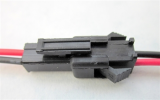You are using an out of date browser. It may not display this or other websites correctly.
You should upgrade or use an alternative browser.
You should upgrade or use an alternative browser.
To crimp or solder
- Thread starter Shunter46
- Start date
Rhinochugger
Retired Oik
Yep, that crimp tool will overcome the issues where the cable size does not precisely match the wire gauge.I'm not familiar with what is available over there, but here we have connectors with the same type of "crimp area".
The business end can be open, closed (ring), or a male or female "spade" (in 3 different sizes), bullet, and splice are the ones I can think of off the top of my head (and I have here)
In the use, there are usually 3 basic sizes for wire gauge, color coded to red, blue, yellow (small to large wire gauge)

The crimp I use basically punctures the center (not on the split side) and compresses it.
The cheap crimpers just smash these into an oval, very poor, the wires will slip out.
There is a specific tool with a "finger" that adds pressure to the crimp, but more importantly "locks" wires from pulling out.... see the "indent here"

I've successfully crimped wires (for applications other than garden railways) without that extra indent - but it does rely on the wire gauge being a close fit inside the chosen colour of crimp connector.
The indent make is possible to use a slightly oversize crimp connector.
And yes, we have the same options of crimp connectors, but for the fact, certainly in the red size, I now have three different sizes of spade - male / female - connectors.
2mm, 4mm and 6mm I think
Greg Elmassian
Guest
When I solder this type of terminal, I twist off the insulation, slide a piece of heat shrink on the wire, crimp, solder, heat shrink...
Greg
Greg
JimmyB
Now retired - trains and fishing
So the crimper and connections are a little different, JST (Japanese Solderless Technology), the link below is to just one of the many out there:
https://www.amazon.co.uk/Crimping-R...nnector&qid=1605949032&sr=8-7&tag=googhydr-21
https://www.amazon.co.uk/Crimping-R...nnector&qid=1605949032&sr=8-7&tag=googhydr-21
Last edited:
Rhinochugger
Retired Oik
There's 101 ways of killing a catSo the crimper and connections are a little different, JST (Japanese Solderless Technology), the link below is to just one of the many out there:
https://www.amazon.co.uk/Crimping-Ratchet-Connectors-0-1-1-0mm²-Connector/dp/B07VC383KW/ref=sr_1_7?adgrpid=52516957599&dchild=1&gclid=Cj0KCQiAkuP9BRCkARIsAKGLE8VZTYeOFEV5rMiKx5mgH6j-qPoCNvydWa955XFAUzBKy2E-WAS0RNsaAhSuEALw_wcB&hvadid=259032864657&hvdev=c&hvlocphy=1006554&hvnetw=g&hvqmt=e&hvrand=12372370907072798076&hvtargid=kwd-300568299507&hydadcr=28151_1821057&keywords=jst+xh+connector&qid=1605949032&sr=8-7&tag=googhydr-21
I think the key thing is using the appropriate method for the situation - and we'll all have our favourites; a bit like the question of electrical track connections.
With a bit of luck we won't have confused our friend too much, even if we end up confusing ourselves
I'm just in the middle of doing some minor wiring for the car, so I've been busy soldering crimped tags
Greg Elmassian
Guest
Yes Jimmy, you can really go overboard when you start using more sophisticated crimps, like most in the electronics industry, where you actually have 2 crimps per connector, one on the insulation and one on the wire.
I have about 6 crimping tools personally, and for the above mentioned crimps, you need a crimper to the EXACT size needed. To me the crimps look like a little "w". We have these at work (I run a small engineering company) and we buy the professional tools where the crimper usually exceeds $100.
But normally in this hobby, this kind of connector can be purchased with the wire already attached.
Greg
I have about 6 crimping tools personally, and for the above mentioned crimps, you need a crimper to the EXACT size needed. To me the crimps look like a little "w". We have these at work (I run a small engineering company) and we buy the professional tools where the crimper usually exceeds $100.
But normally in this hobby, this kind of connector can be purchased with the wire already attached.
Greg
PhilP
G Scale, 7/8th's, Electronics
Greg Elmassian
Guest
Ahh, that's the "extra cost" option, used for autoreversing in DCC ! 
PhilP
G Scale, 7/8th's, Electronics
Really cheap, actually..Ahh, that's the "extra cost" option, used for autoreversing in DCC !
When pointed out to the seller, they made and sent 100 pairs wired the exact opposite to those above. - No charge!
An excellent result, from where I was sitting.
JimmyB
Now retired - trains and fishing
Greg, as said earlier I use the crimps for loco work (with JST-XH connectors) and solder for track work, and again you are quite correct about prices, I paid around £20.00 for my crimps which is cheap, but they do work, looking at what "seems" like similar crimps from a professional organization - £400.00Yes Jimmy, you can really go overboard when you start using more sophisticated crimps, like most in the electronics industry, where you actually have 2 crimps per connector, one on the insulation and one on the wire.
I have about 6 crimping tools personally, and for the above mentioned crimps, you need a crimper to the EXACT size needed. To me the crimps look like a little "w". We have these at work (I run a small engineering company) and we buy the professional tools where the crimper usually exceeds $100.
But normally in this hobby, this kind of connector can be purchased with the wire already attached.
Greg

